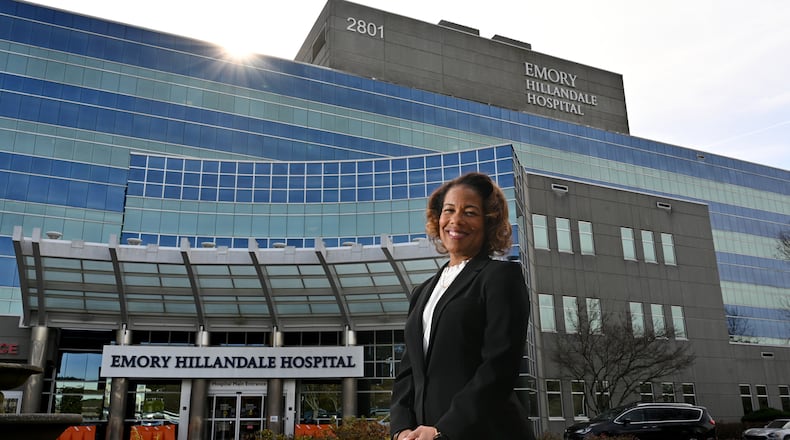Dr. Sandra Elizabeth Ford took away one key lesson from her 15-plus years as DeKalb’s health director: Physical health requires more than medical care.
These non-medical factors tied to where and how a person lives are called social determinants. Do people have access to high-quality child care and education? Good-paying jobs? Safe, affordable housing? Food?
Researchers believe social determinants account for up to 50% of health outcomes, making people more or less likely to have physical health problems simply by virtue of where and how they live. Access to medical care matters, but it’s not the only thing that matters.
“We’re not going to doctor our way out,” Ford said.
Ford helped write the playbook on how to improve social determinants of health. After she left the health department in 2021, she joined the Biden administration’s Domestic Policy Council and spearheaded the creation of a strategic plan that outlined how to tackle social determinants nationwide.
Now, she’s back in DeKalb, where CEO Michael Thurmond hired her to serve as the county’s first special adviser for health care. Between the pandemic and last year’s closure of Atlanta Medical Center, which increased pressure on Fulton and DeKalb counties’ Grady Health System, health concerns have dominated Thurmond’s tenure as CEO.
“We wanted to create a more proactive response,” Thurmond said.
As special adviser, Ford is taking the U.S. playbook and applying it to DeKalb.
The plan is three-pronged, calling for expanded data gathering, flexible funding and community-based partnerships. In Ford’s first year on the job, DeKalb has been refocusing its approach along those lines.
Some of the biggest changes involve Grady, which is jointly owned by Fulton and DeKalb counties and which serves residents of both, regardless of their ability to pay. Last month, DeKalb County commissioners approved a new contract with Grady that calls for DeKalb to subsidize the hospital’s operations by $44.3 million over the next two years.
The new contract includes a new data-sharing agreement that Ford says will be key to helping with the county’s efforts to improve health outcomes. If a patient is treated at Grady and seeks follow-up services from the county’s health department, officials will be able to see the care they’ve already received and can better tailor referrals to other services. It should cut down on duplicative services.
“That’s a game-changer,” Ford said. “Data is power.”
Under the new contract, Grady has committed to opening three neighborhood health centers in DeKalb, the sort of community-based partnerships that are part of Ford’s plan for improving health outcomes.
These clinics will be located based on where the greatest needs are — another data-driven decision.
DeKalb has partnered with Morehouse School of Medicine to do a healthcare landscape assessment that will identify the existing providers in the area and the gaps.
The assessment will also be looking at access to providers. To address an issue like maternal mortality — an area where Georgia ranks at the bottom nationwide — Ford wants to know not only where the obstetric providers are but also whether they accept Medicaid or are located near public transportation, for instance. Those barriers could be keeping people from getting necessary care.
“On paper it may look fine but in reality there may be gaps,” she said. “This study will help us identify what’s the real picture of service availability.”
Besides Grady, DeKalb is also growing its partnerships with Emory, which runs hospitals in Decatur and Lithonia. Last year, the county approved $12 million for improvements at Emory Hillandale Hospital, which saw its patient count go up after the closure of the Atlanta Medical Center.
Hillandale has expanded its emergency waiting room and reconfigured its intensive care unit to make it easier to provide care, said Mike Steele, the hospital’s specialty director of emergency services. Some of the changes were as simple as relocating lab services to cut down on how long it takes to get patients’ results — a change that means people can be diagnosed, treated and discharged faster.
Hillandale plans to add a trauma recovery and violence prevention program that will include psychologists, outreach workers and behavioral health specialists. Ford is excited about the partnership with Emory and said it’s a good example of the holistic approach she wants to see.
Thurmond says hearing Ford talk about social determinants has made him realize how interconnected many non-medical issues are with health. It’s why he says he’s continued initiatives like the monthly food distributions that began during the pandemic.
Up next on Ford and Thurmond’s agenda is Medicaid expansion. Georgia is one of a handful of states that have not expanded Medicaid to insure all poor adults, but legislators have been discussing whether to reconsider.
DeKalb, Fulton and Grady all are pushing for Medicaid expansion, which would relieve the counties from having to subsidize Grady’s operations. That, in turn, would free up money in DeKalb for other health initiatives, Ford said.
“It’s a transfusion of support into states and municipalities,” Ford said.
About the Author





